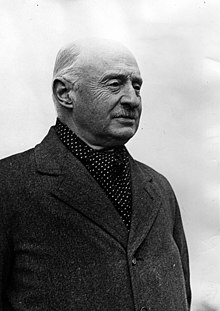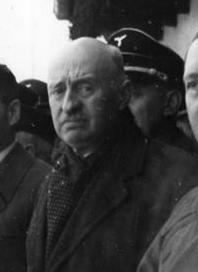Henri de Baillet-Latour
The Belgian Count Henri de Baillet-Latour (born March 1, 1876 in Brussels ; † January 6, 1942 there ) was the third President of the International Olympic Committee (IOC) from 1925 until his death in 1942 .
Life
De Baillet-Latour became a member of the IOC in 1903. Three years later he was a co-founder of the National Olympic Committee of Belgium. Theodor Lewald , who was the civil administrator of Belgium for the imperial government, helped him during the First World War, which made it easier for Lewald to become a member of the IOC.
At the Olympic Games in Antwerp in 1920 he took on central tasks in the organization. The first games after the end of the First World War , which Antwerp was only entrusted with hosting in 1919, were a great success despite the short preparation time and the difficult circumstances in which the country found itself two years after the end of the war. The founder of the Olympic movement, Pierre de Coubertin , had built him up as his successor by enabling him to travel to South America for the IOC and to set up a large number of national Olympic committees and to recruit new IOC members. These then all voted for him. Baillet-Latour, together with the American YMCA and local politicians and sports experts, was also involved in the spread of Western sport in Asia, which is still unknown in many places.
When Coubertin retired from the office of IOC President in 1925, De Baillet-Latour was elected as his successor. He headed the organization until his death in 1942. His successor was Vice President Sigfrid Edström .
literature
- Hans Joachim Teichler : They weren't offended . The IOC Presidents and the Third Reich. In: FAZ. March 10, 1999.
Web links
- Biography at olympic.org (PDF; English)
Individual evidence
- ^ Arnd Krüger & Rolf Pfeiffer: Theodor Lewald and the instrumentalization of physical exercises and sport. Uwe Wick & Andreas Höfer (eds.): Willibald Gebhardt and his successors (= series of publications by the Willibald Gebhardt Institute, vol. 14). Aachen: Meyer & Meyer 2012, pp. 120-145, ISBN 978-389899-723-2
- ↑ Arnd Krüger: Neo-Olympism between nationalism and internationalism, in: Horst Ueberhorst (Hrsg.): History of physical exercises . Tape. 3/1, Berlin: Bartels & Wernitz 1980, 522 - 568.
- ^ Stefan Huebner: Pan-Asia Sports and the Emergence of Modern Asia, 1913-1974 . NUS Press, Singapore 2016, ISBN 978-981-4722-03-2 , pp. 17-101 .
| personal data | |
|---|---|
| SURNAME | Baillet-Latour, Henri de |
| BRIEF DESCRIPTION | 3. President of the International Olympic Committee |
| DATE OF BIRTH | March 1, 1876 |
| PLACE OF BIRTH | Brussels |
| DATE OF DEATH | January 6, 1942 |
| Place of death | Brussels |

